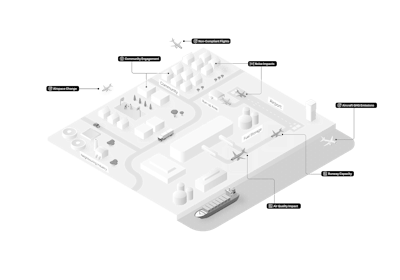Aviation is arguably one of the world’s most important industries while also being one of its most impressive. It's where the cutting-edge technology meets the open skies to connect the world in a way that was not possible for most of our existence.
However, an existential threat looms large—the global imperative to achieve Net Zero. This ambitious objective signifies the industry's dedication to a carbon-neutral future, challenging the fundamental principles of aviation at its core, particularly on the reliance on fossil fuel-driven planes that have been the cornerstone of the industry’s success.
We asked Simon Heath to summarise what it means when we hear the term ‘Net Zero’ in the aviation industry; and here’s what he had to say:
Simon Heath is an aviation industry veteran with over 20 years of experience in the industry specialising in applied environmental science and technology at airports. He has guided the implementation of effective solutions at some of the most environmentally constrained airports across the USA, Asia-pacific, and Europe.

The aviation industry has always recognised the urgency of this transition and acknowledges that achieving Net Zero requires more than minor adjustments. Electrification is emerging as a pivotal strategy, promising to revolutionise the way we power and propel aircraft, marking a radical departure from traditional propulsion systems.
The need for redesign of airspace beyond electrification
While electrification is a crucial step, the industry is also exploring broader concepts, including flying to different destinations and embracing alternative aircraft designs. This holistic approach extends beyond reducing carbon emissions, aiming to fundamentally reshape the very nature of air travel.
However, a significant challenge arising from the Net Zero revolution in aviation is the redesign of airspace. Communities accustomed to specific flight paths and noise levels are poised for a transformative shift. This requires unprecedented collaboration and communication between stakeholders—communities, airlines, suppliers, and Air Navigation Service Providers (ANSPs)—for a successful navigation of the industry’s flightpath to the future.
From local concerns to systemic overhaul
The industry's evolution is evident in its shift from addressing local issues, such as noise pollution, to contemplating a complete overhaul of the aviation system. This systemic transformation requires a united effort from the entire industry, as they commit to finding solutions that balance environmental sustainability with operational efficiency at airports.

Contemplation of this task’s enormity reveals that the industry is not merely undergoing incremental changes but embarking on a monumental redesign. Encouragingly, Net Zero is fuelling a new wave of energetic and passionate collaboration is joining the aviation sector, eager to contribute their expertise towards achieving Net Zero. Their commitment stems from the realisation that sustainable aviation isn't about grounding flights but ensuring the industry thrives in an environmentally responsible manner.
Envirosuite partners making strides towards Net Zero goals on their flightpath to the future
The aviation industry's pursuit of Net Zero transcends technological upgrades; it represents a philosophical shift that demands collaboration, innovation, and collective determination and Envirosuite is committed to partner with airports on their mission critical transition.
Several of our key aviation partners, including NavCanada and the Greater Toronto Airports Authority, recently shared their strategies for Net Zero at Forum23. Their approach to tackling these challenges involves an intricate fusion of state-of-the-art technologies, showcasing a commitment to innovation and sustainability.

Representatives from NavCanada and Toronto Pearson International Airport at FORUM23 in Palm Springs, California.
Talk to us today and find out more about how these industry leaders are leveraging technology and advancing towards the pathway to Net Zero today.
